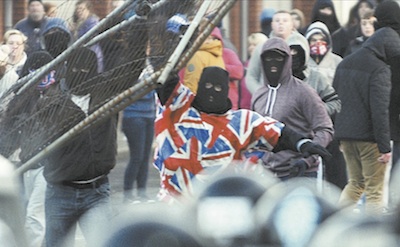
The media coverage of the flag protests and riots is being increasingly called into question after members of the UVF were seen to act as guides for some members of the international media covering the flags protests.
The loyalist paramilitaries were hired by some foreign crews visiting Belfast to file reports.
Violence surrounding the protests has attracted global interest with reporters from news networks around the world being dispatched to Ireland to cover the story.
While the majority of local, national and international media have been working independently, some foreign networks have been hiring ‘guides’ in areas such as east Belfast.
A large number of international crews were surprisingly well placed to cover riots in the Albertbridge Road area. Several were in the company of known paramilitaries, including former UVF prisoners.
Foreign journalists were reported to have made contact with loyalist representatives and asked for loyalists to act as guides during their stay.
UVF members appointed to watch over the journalists were seen not only driving them to ‘flashpoints’ but also arranging interviews with people who live in east Belfast.
Meanwhile, the BBC has been accused of bias after an almost entirely loyalist audience heckled nationalists and shouted sectarian comments during a television talk show.
BBC chat show host, Stephen Nolan, apologised after admitting a loyalist flags protest outside BBC headquarters had affected the composition of the audience for the programme.
Throughout the show, which was broadcast on Wednesday night, audience members interrupted Sinn Féin assembly member Gerry Kelly when he spoke and heckled other speakers who disagreed with them.
There were regular shouts of “traitor”, “Lundy” and “no surrender” during the ‘debate’.
Audience members cheered when footage of loyalist rioters was shown in the studio, although this was later edited out of the programme.
Even the moderate unionist Alliance Party described the show as “intimidating”.
A Sinn Féin spokesman said “clearly there was an issue of bias and balance in the audience and we will be raising this with the BBC.”
A spokeswoman for the BBC said tickets for the event were issued on a “first come first serve basis”.
Elsewhere, hate messages against Catholics were proliferated by loyalists and their supporters across internet social networks.
In the past few weeks, there were calls to shoot Catholics at random and death threats against Sinn Féin politicians.
There were threats against individual nationalists whose photographs and personal details have been posted, plus vile anti-Catholic abuse and homophobic comments.
The PSNI have admitted that more than six weeks into the violence, not a single person has been questioned about making online threats.
However, Sinn Féin’s Alex Maskey came under a propaganda bombardment after he said he could understand why nationalists in the Short Strand would defend themselves from loyalists.
The South Belfast Assembly member was speaking as homes in the nationalist enclave and the local Catholic church were being attacked with petrol bombs on Monday night, with reports that some Catholic residents had also thrown stones.
“What we’ve been hearing tonight is people from the Short Strand throwing stones back and, if they are, they’re defending their homes.
“And if I lived in the Short Strand, I’d be throwing the stones along with those people - because it’s disgraceful what those people are having to put up with.”
Mr Maskey subsequently repeated his assertion that under the circumstances people close to the Short Strand interface had endured, he would defend his home.
Amid unionist ‘outrage’, Mr Maskey said he stood by the comments.
“I made it very clear that I would defend my home if it was coming under attack,” he said.
“I will take no lectures from people who on one hand criticise me but on the other do nothing to challenge the people responsible for attacking nationalist homes.”
![[Irish Republican News]](https://republican-news.org/graphics/title_gifs/rn.gif)
![[Irish Republican News]](https://republican-news.org/graphics/title_gifs/harp.gif)

